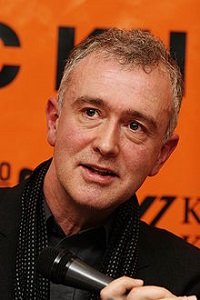De Ierse schrijver Joseph Victor O’Connor werd geboren op 20 september 1963 in Dublin als oudste van vier kinderen. Hij is een broer van zangeres Sinéad O’Connor. O’Connor bezocht het Blackrock College en studeerde af aan het University College Dublin met een M.A. in Anglo-Irish Literature. Hij werkte als postacademicus aan de universiteit van Oxford en behaalde een tweede M.A. van de Northern School of Film and Television van Leeds Metropolitan University in scenarioschrijven. Aan het eind van de jaren tachtig werkte hij voor de Britse Nicaragua Solidarity Campaign; in zijn tweede roman, “Desperadoes”, putte hij uit zijn ervaringen in het revolutionaire Nicaragua. Voor zijn succes als schrijver was hij journalist bij de Sunday Tribune en het tijdschrift Esquire. O’Connor levert regelmatig bijdragen aan Raidió Teilifís Éireann (RTÉ). In 1991 debuteerde hij met “Cowboys and Indians” datop de shortlist kwam voor de Whitbread Prize. Op 10 februari 1985 werd de moeder van O’Connor gedood bij een auto-ongeluk. De moeder van het personage Sweeney in “The Salesman” (1998) stierf op een soortgelijke manier. In 2002 schreef hij de roman “Star of the Sea”, die een internationale bestseller werd. Zijn historische roman “Redemption Falls”verscheen in 2007. “Ghost Light” uit 2010 is losjes gebaseerd op het leven van de actrice Maire O’Neill, geboren in Mary “Molly “Allgood, en haar relatie met de Ierse toneelschrijver John Millington Synge. O’Connor woonde in New York, Londen en kort in Nicaragua, voordat hij terugkeerde naar Dublin, waar hij met zijn gezin woont. Sinds 2014 is hij hoogleraar creatief schrijven aan de Universiteit van Limerick.
Uit: Star of the Sea
“The Right Honourable Thomas David Nelson Merridith, the noble Lord Kingscourt, the Viscount of Roundstone, the ninth Earl of Cashel, Kilkerrin and Carna, entered the Dining Saloon to an explosion of smashing glass.
A steward, a Negro, had stumbled near the doorway, bucked by a sudden roll of the vessel, letting slip an overloaded salver of charged champagne flutes. Someone was performing an ironic slow-handclap at the fallen man’s expense. An inebriated mocking cheer came from the farthest corner: ‘Huazzah! Bravo! Well done, that fellow!’ Another voice called: ‘They’ll have to put up the fares!’
The steward was on his knees now, trying to clear the debris. Blood was rivuleting down his slender left wrist, staining the cuff of his brocaded jacket. In his anxiety to collect the shards of shattered crystal he had sliced open his thumb from ball to tip.
‘Mind your hand,’ Lord Kingscourt said. ‘Here.’ He offered the steward a clean linen handkerchief. The man looked up with an expression of dread. His mouth began to work but no sound came. The Chief Steward had bustled over and was barking at his subordinate in a language Merridith did not understand. Was it German, perhaps? Portuguese? Saliva flew from his mouth as he hissed and cursed the man, who was now cowering on the carpet like a beaten child, his uniform besmirched with blood and champagne, a grotesque parody of commodore’s whites.
‘David?’ called Merridith’s wife. He turned to look. She had half risen from her banquette at the Captain’s table and was gaily beckoning him over with a bread-knife, her knotted eyebrows and pinched lips set in a burlesque of impatience. The people around her were laughing madly, all except the Maharajah, who never laughed. When Merridith glanced back towards the steward again, he was being chivvied from the saloon by his furious superior, the latter still bawling in the guttural language, the transgressor cradling his hand to his breast like a wounded bird.
Lord Kingscourt’s palate tasted acridly of salt. His head hurt and his vision was cloudy. For several weeks he had been suffering some kind of urinary infection and since boarding the ship at Kingstown, it had worsened significantly. This morning it had pained him to pass water; a scalding burn that had made him cry out. He wished he’d seen a doctor before embarking on the voyage. Nothing for it now but to wait for New York. Couldn’t be frank with that drunken idiot Mangan. Maybe four weeks. Hope and pray.”

Joseph O’Connor (Dublin, 20 september 1963)
